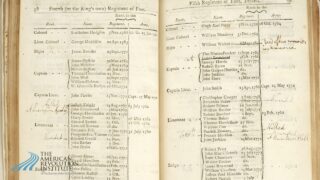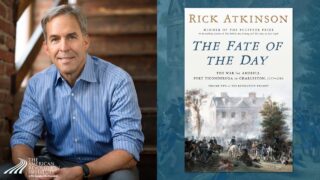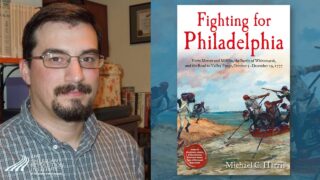Supporting scholarship and promoting popular understanding of the American Revolution is central to the work of the American Revolution Institute. The Institute welcomes distinguished scholars and authors to share their insights and discuss their latest research with the public at Anderson House through lectures, author's talks and panel discussions. The Institute also hosts a variety of other historical programs throughout the year, including our Lunch Bite object talks, battlefield tours, special Anderson House tour programs and other events. Many of the events we offer are free.

June 2025
Lunch Bite—A 1773 British Army List
The Institute’s historical programs manager, Andrew Outten, discusses a 1773 register of British Army officers, annotated with casualties suffered during the first battles of the Revolution—most notably at the Battle of Bunker Hill. Beginning in 1740, the British Army published annual books listing officers serving within the army’s various regiments, along with their dates of commissions and promotions and other pertinent information. Drawing from the annotations contained within the 1773 British Army List from our library collections, this presentation will…
Find out more »Author’s Talk—The Fate of the Day: The War for America, Fort Ticonderoga to Charleston, 1777-1780
The first twenty-one months of the American Revolution—which began at Lexington and ended at Princeton—was the story of a ragged group of militiamen and soldiers fighting to forge a new nation. By the winter of 1777, the exhausted Continental Army could claim only that it had barely escaped annihilation by the world’s most formidable fighting force. Two years into the war, George III was determined to bring his rebellious colonies to heel, though his task was far too complicated. Not…
Find out more »July 2025
The Comte de Rochambeau’s 300th Birthday Celebration
The comte de Rochambeau, the commander in chief of France’s 1780 expeditionary force sent to aid the Continental Army, played a pivotal role in helping to secure American independence. To commemorate the 300th birthday of this important figure of the American Revolutionary War, join us and the Washington-Rochambeau Revolutionary Route National Historic Trail for a special evening honoring the French commander. Beginning at 6 p.m., a performance by the Chorale de l'Ambassade de France will kick off the celebrations before…
Find out more »Author’s Talk—The Painter’s Fire: A Forgotten History of the Artists Who Championed the American Revolution
Historian Zara Anishanslin discusses her new book that highlights three remarkable artists devoted to the pursuit of liberty. The American Revolution was not only fought in the colonies with muskets and bayonets. On both sides of the Atlantic, artists armed with paint, canvas, and wax played an integral role in forging revolutionary ideals. Drawing from her new book, Dr. Anishanslin charts the intertwined lives of three such figures who dared to defy the British monarchy—Robert Edge Pine, Prince Demah, and…
Find out more »August 2025
Author’s Talk—Fighting for Philadelphia: Forts Mercer and Mifflin, the Battle of Whitemarsh, and the Road to Valley Forge
The weeks of bloody maneuvering and fighting along the Delaware River at Fort Mercer, Fort Mifflin, and Gloucester receive but scant attention in the literature of the American Revolution. The same is true for the five-day Whitemarsh operation and other important events in December 1777. This period of the war began when Gen. Sir William Howe’s army of 16,500 British and Hessian soldiers set out aboard a 265-ship armada from New York to capture Philadelphia in late July 1777. Six…
Find out more »



